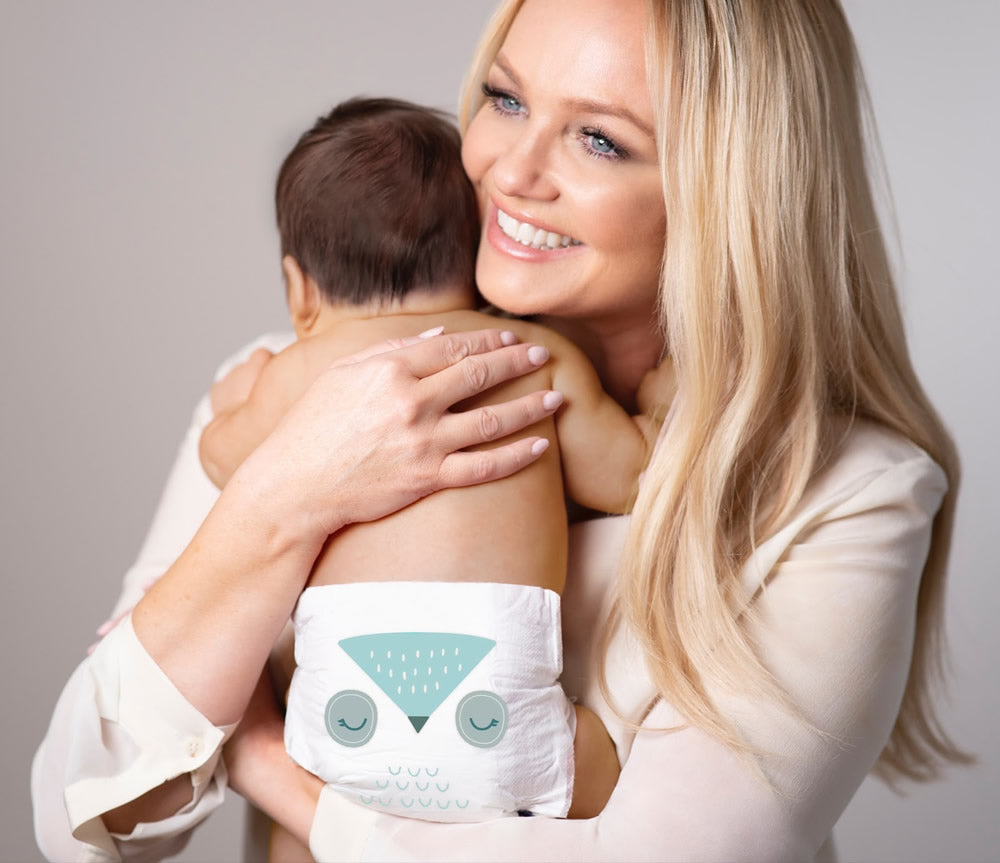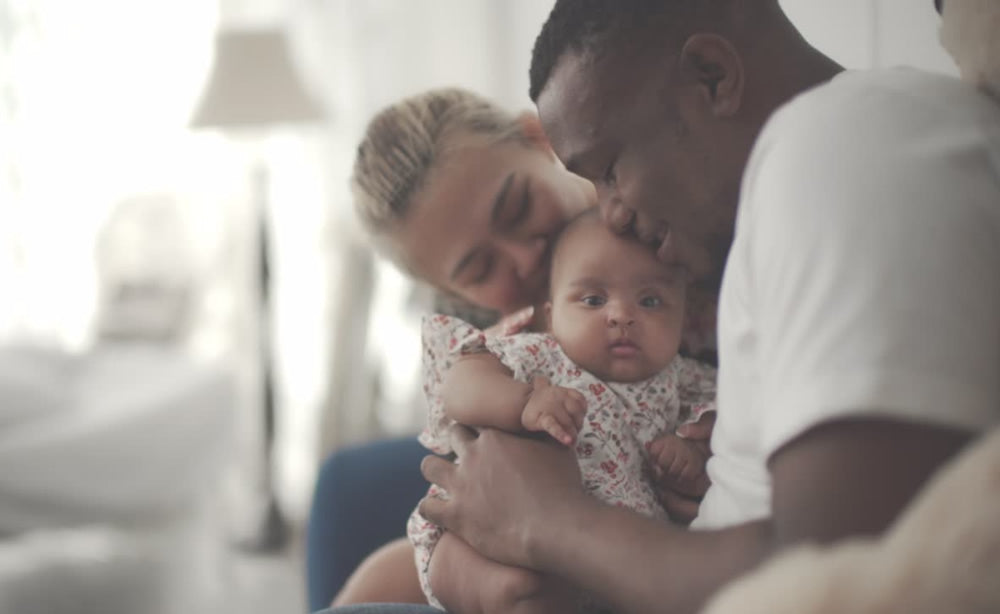Hello! I’m Kiran, a mum to three beautiful children and a Paediatric Doctor living in London. I’ve been on the wonderful and weary journey sometimes referred to as the fourth trimester three times. The beauty of it all is that as a mother and as a children’s doctor, my journey has been shaped by so many mothers and fathers along the way. I had more knowledge the third time around, more shared experience to fall back on and most importantly much more kindness to show myself.
Now I’m here to help you understand what to expect in the fourth trimester and how to best prepare.
What does ‘fourth trimester’ mean?
The fourth trimester describes a transitional period between birth and 12 weeks postpartum. It can be a challenging time during which your baby is adjusting to the world and you are adjusting to your baby.
It can help to think of the fourth trimester as two journeys woven together. The first journey is the postpartum journey and relates to you, the parents, the changes in your body, hormones and importantly in your emotional health.
The second journey relates to your baby and describes a period of major developmental changes, known as the postnatal period. Whilst the two are intertwined together and relate to the period after birth, for the purpose of this blog post I will focus on them as two separate journeys, to help you understand this extraordinary time better.
Your fourth trimester as a parent
Whilst babies bring so much joy to their parents and unimaginable love, as a paediatrician I want you to know that YOU and your physical and emotional health are equally important. Many parents experience postnatal blues, anxiety and many other overwhelming emotions that can affect the way they bond with their baby.
Birth trauma
I meet many parents that are experiencing birth trauma in those first few weeks after baby arrives. They haven’t processed the birth, particularly if it didn’t go as planned and struggle to understand why they feel the way they do.
Birth trauma can happen in the birthing parent or in their partner and it is imperative that once baby has arrived, you sit together and talk about what happened, what went well and what you might need help to understand.
Many hospitals now offer a service where you can discuss your birth and can help bring parents much needed comfort and closure to some of the trauma they have experienced. You can find more information about birth trauma at the Birth Trauma Association or Make Birth Better.

Parental emotional health
Baby blues
The first week of postpartum life brings with it ‘baby blues’ for many women. A change in hormones and the realisation that you have a new life to care for can be incredibly overwhelming and you may feel low, irrational, emotional and you may cry for no apparent reason. Baby blues are incredibly common and usually go away within a few weeks. Remember, not everyone feels intense joy or happiness after birth and that’s absolutely okay.
Postnatal depression
If you find that after a few weeks your feelings don’t go away or get worse, then this could be a sign of postnatal depression. 1 in 5 women experience postnatal depression. You are not alone!
Postnatal anxiety
Whilst a lot of focus is on baby blues and postnatal depression, a lot of mothers experience postnatal anxiety. Anxiety can manifest in many ways but commonly parents describe a sense of dread, a feeling of unease and inability to relax and being constantly on edge. They find it hard to discuss their negative feelings especially as they are ‘expected’ to feel happy and fine. They may worry about their own health, their baby’s health and that things have or may go wrong. Anxiety can be incredibly overwhelming and parents can experience intense panic attacks and very real physical symptoms.

Get help
Please always remember that many new parents experience some of these symptoms and you are not alone! Please speak to your health visitor, Midwife or GP as there is lots of help available.
There’s also a wealth of information and support on Maternal Mental Health Alliance and PANDAS for mothers who need support with their mental health and their families.
Your baby’s fourth trimester
There are so many things one can expect in the postnatal period and it is impossible to go through them here. I will try to list the common things that MOST babies will experience.
Newborn feeding and weight loss
Your newborn baby’s tummy is surprisingly small, almost the size of their palm, and this means they will feed little and often. Some babies may nurse/bottle feed every 1.5-2h whilst others may go 3h between feeds. Most babies will lose weight once you bring them home and this is normal. Usually your baby will be weighed regularly in the first two weeks of life. It is normal to lose up to 10% of their birth weight in the first few days and most babies are back to their birth weight by 2 weeks of life.
It’s really important that your baby feeds regularly. If they are regularly falling asleep during feeds, having difficulties feeding or they’re losing weight, you should seek advice from either your midwife, a lactation consultation or your doctor.
Crying
Crying is developmentally normal for your baby and it’s important that as doctors and parents, we normalise it. On average, babies cry for 2-3h a day in the first 6 weeks of life! Normal crying follows a circadian rhythm which means it is often worse in late evenings and early morning. In other words, 70% of the crying happens between noon and midnight, and is often associated with inconsolable bouts, where nothing you try seems to console your little one.
Should I worry about my baby crying?
There is no right or wrong answer here. When you meet your baby, you will quickly learn their patterns. As a general rule, if your baby cries for more than 3 hours a day, for more than 3 days a week, over a period of 3 weeks, you need to get some help.
It’s also important that if you think your baby's crying has a pattern you seek help. Keeping a diary (if you can) can help identify when a baby is fussy and why. For example, if your baby is always upset after feeds or just before they poop then that might tell healthcare professionals something is going on!
All babies cry. It is a matter of fact. We also know mothers cry and fathers cry. Nobody should be crying alone. If you feel overwhelmed, please reach out for support.
Rashes
Most newborns will have some sort of skin rash when they are born. Reassuringly, most of these are nothing to worry about. I’ll walk you through some of the commonest ones:
1. Milia:
- tiny white bumps on nose, face or around eyes
- caused by blocked oil glands
- usually disappear within a few weeks
2. Diaper rash:
- red, sore skin on your baby’s bottom or genitals
- caused by urine and poo on baby’s sensitive skin as well as chemicals found in baby products
3. Erythema toxicum (this sounds a lot worse than it actually is!!):
- blotchy red rash with pin sized solid bumps
- usually on face, but sometimes on stomach, arms and legs
- commonly appears in first few weeks and disappears within a few days
4. Other common rashes include heat rash and stork marks.

How to prevent and treat rashes
A few tips to keep baby’s sensitive skin happy:
- use hypoallergenic eco diapers made from plant-derived materials
- allow diaper-free time for any existing diaper rash to clear
- when using wipes, ensure they are fragrance and alcohol free
- use a 100% natural barrier-cream with every diaper change
- avoid talcum powder and cornstarch
- ensure that any products you use on baby’s skin are hypoallergenic, ph-balanced and certified natural (and consequently free from parabens and SLS)
The most important thing to know about rashes is to seek urgent medical attention if:
- they occur with a fever or
- they don’t fade on pressing down on the affected skin with your fingers
Reflux
Reflux is a normal process and it occurs in 4 out of 10 babies. It is associated with bringing up milk shortly after a feed. For most babies, reflux will begin by about 8 weeks of age and resolve as the baby gets older. At around 4 months, reflux is usually at its worst, meaning it occurs several times a day and can cause babies upset. Reassuringly, 50/100 babies won’t have reflux at 6 months and 90 out of 100 babies will not have reflux by the time they reach their first birthday. Whilst reflux may be ‘normal’, having a very fussy or upset baby needn’t be. There are lots of things you can try to ease baby’s reflux.
Trust your parental instinct, if something isn't right, see a doctor. Not all babies with reflux need treatment and if your baby is diagnosed with reflux, your doctor will talk you through the options available to you.
Signs that your baby might have reflux:
- Spitting up milk during or after feeds (up to 6 times a day)
- Excessive irritability or crying during feeding
- Frequent ear infections
- Difficulty feeding: gagging, choking, refusing feeds
- Frequent hiccups
- Arching back during feeds
- Drawing up legs after a feed
Silent reflux:
This really isn’t a very helpful name! There is nothing silent about reflux, if your baby has reflux and is uncomfortable with it, trust me you'll know all about it!!
It’s called silent reflux, because there may not be any 'outward' symptoms such as posseting or difficulty feeding. Just irritability/frequent crying or fussiness.
Colic
Colic is a term that means different things to different people. The hallmark of colic is usually inconsolable bouts of crying, particularly in the evening. In my experience most if not ALL babies are ‘colicky’ at some point in the first few months of life.
Colics follow the same pattern as normal crying but there’s just more of it in an otherwise well baby. The ‘well baby’ is the most important part of that statement. This means that it is a diagnosis of exclusion.
As a doctor, it means I’ve taken a thorough history and exam to make sure nothing else is going on, before coming to this conclusion.
When to seek help:
As a new parent, the information you receive about your baby can be incredibly overwhelming. Take it one step at a time. Sometimes babies need urgent medical attention and as parents it’s not always easy knowing what to do when.
Parents should ALWAYS see a doctor if their baby has any of the following:
- Fever >38°C
- Reduced wet diapers (<2 a day)
- Feeding <50% of normal
- Persistent or projectile vomiting
- Blood in diaper
- Sleepy/lethargic baby
This is not an exhaustive list. The most important thing is to trust your instinct. If you think something is not right, seek help. This can be via your midwife, health visitor, GP or even A&E if you think it’s urgent. As a paediatrician, I would much rather see a worried parent and reassure them, than not see one at all.
Final word
 |
I hope you’ve enjoyed reading this blog post and it will help empower you to navigate the trials and tribulations of the fourth trimester. If you have any questions please feel free to reach out to me on my Instagram page TheMunchingMedic. I hold regular Q&As that my community find very useful and share frequent tips and trick on baby, child and adolescent health. Sending you love and solidarity on this incredible parenting journey. Kiran Dr Kiran Rahim |
























